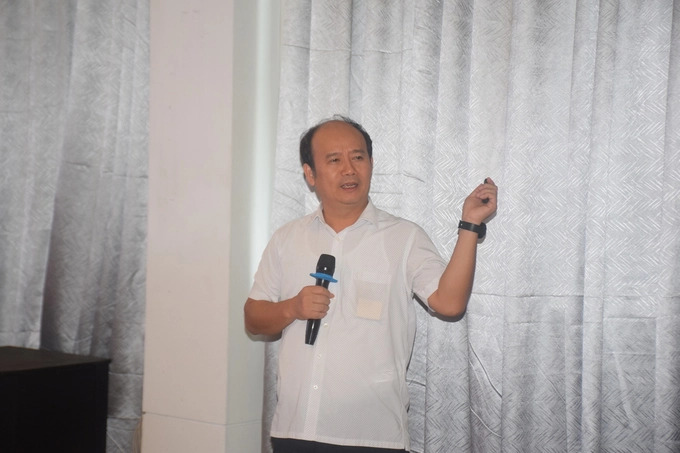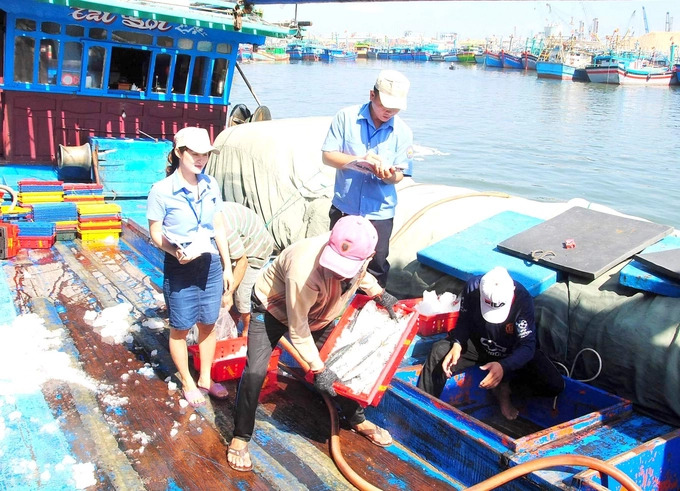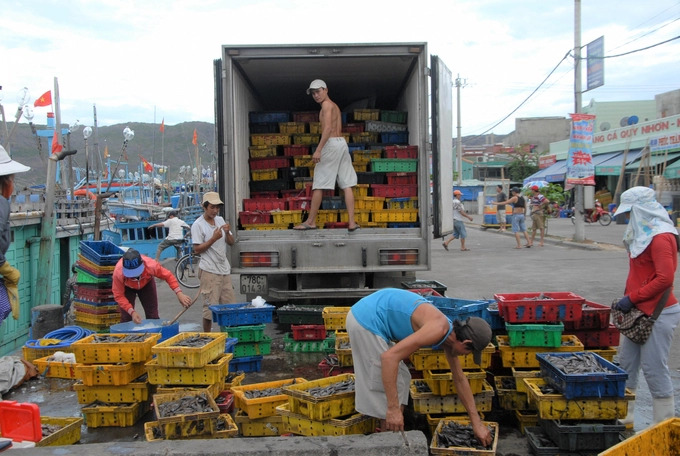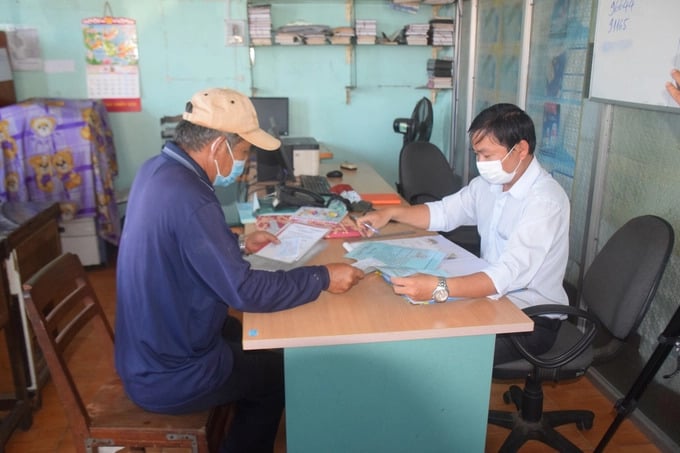May 21, 2025 | 09:19 GMT +7
May 21, 2025 | 09:19 GMT +7
Hotline: 0913.378.918
May 21, 2025 | 09:19 GMT +7
Hotline: 0913.378.918
In Binh Dinh province, the Directorate of Fisheries (DoF) on August 25 held a training course on the control of fishery products caught and unloaded at fishing ports to prevent acts of violation in the IUU fishing. Participants include leaders and staff of 26 domestic fishing ports.
According to Mr. Vu Duyen Hai, Deputy Director Fisheries Department under the DoF, the Law on Fisheries stipulates that fishery products must be inspected at fishing ports to prevent and reject all of those related to violated fishing activities of 14 IUU fishing practices. Therefore, fishing ports are responsible for controlling fishing products right at the port while they are being unloaded. If violations are detected in fishing vessels, the ports must refuse to load and unload products, then transfer them to the management agency for handling following the regulations.

Mr. Vu Duyen Hai, Deputy Director of the Department of Fisheries speaks at the training course. Photo: V.D.T.
Mr. Hai also said that by doing so, all Vietnamese seafood products circulating in the market, from the domestic to global ones, will not violate regulations in IUU fishing. This means that Vietnam's seafood products ensure sustainable exploitation and all Vietnamese fishing vessels have complied with the provisions of the law, helping aquatic resources to be better protected and fisheries develop in a sustainable way.
"We have committed to the world that all fishery products caught in Vietnam comply with regulations. Only then will we enhance the Vietnamese seafood brand and its value will have a firm stand in the global market. Therefore, the control of caught fishery products during loading and unloading at the port is very important," said Mr. Hai.

Officials from the Quy Nhon fishing port's Management Board (Binh Dinh province) inspect fishing products at the port. Photo: V.D.T.
The content of the training course was systematized by the DoF based on various legal documents including the Fisheries Law, decrees and circulars so that the implementation is carried out the best, most convenient and simplest ways. At the training session, many opinions from representatives of fishing ports highlighted difficulties and inadequacies in implementing regulation of aquatic products inspection during loading and unloading at the fishing ports.
Mr. Nguyen Minh Khai, Director of the Management Board of Tam Quan Fishing Port (Hoai Nhon town, Binh Dinh province), said: " It is impossibleIf to follow the process with the current 'paper technology', especially for fishing ports with 50-70 ships anchored every day. Each fishing port now owns a bunch of paper documents. The biggest headache is to inspect the boats' fishing diary because each boat sometimes can achieve up to 15 catches and sometimes they record the wrong traveling figures as well as the categories of fishing products....In the coming time, only when fishermen fishing far from the shore apply electronic logging, the fishing ports are more convenient to carry out their inspection work."

Fishery products are purchased by traders at Quy Nhon fishing port (Binh Dinh province) .Photo: V.D.T.
Some participants complained that, despite having been instructed, the implementation of regulation fishing ports has not been synchronized. Some ports are "too loose" while others are very "strict" giving pressure on fishing vessels to follow the rules. This leads to a situation that the same fishing vessel had previously was easy to load and unload products at a port but then faces strict control when arriving at the other port. Thus, complaints arise. All fishing ports need to follow consistency and synchronization in the management and control of caught fishery products when loading and unloading at the port.
According to Mr. Nguyen Anh Dung, Director of Quy Nhon Fishing Port, the training session has helped, supervising officials possess the most simple but effective methods in monitoring vessels in and out of the ports as well as in checking and inspecting fishing vessels and fishery products during loading and unloading.

A fishing boat owner declares at Quy Nhon fishing port (Binh Dinh province). Photo: V.D.T.
“At present, the European market is applying the IUU fishing regulation to Vietnamese seafood. In December 2022, the Japanese and Chinese markets will also apply such the same regulations so we have to be very serious and hard at work to be able to integrate into such markets at the same time. If we only follow the requirements of the European market, it is just an immediate response, not a long-term solution so if the other markets also require the application of IUU, then we have to start again from the beginning and it will be even harder. Documents will be piled up and outdated and if documents are not clear enough, the enterprises will be rejected to enter the above markets. They may face big losses in their business," shared Mr. Vu Duyen Hai, deputy director of the Fisheries Department.
Translated by Linh Nguyen

(VAN) Dong Thap farmers attained an average profit margin of 64% during the summer-autumn 2024 crop (first season), while An Giang and Kien Giang farmers followed with 56% and 54%, respectively.

(VAN) As a doctoral student doing research on renewable energy and electrification at Harvard University, the author shares his musings on electricity, nature, and countryside memories.

(VAN) The decree on Extended Producer Responsibility (EPR) ensures transparent management and disbursement of support funds, avoiding the creation of a “give-and-take” mechanism.

(VAN) Hue City rigorously enforces regulations regarding marine fishing and resource exploitation, with a particular emphasis on the monitoring of fishing vessels to prevent illegal, unreported, and unregulated (IUU) fishing.

(VAN) Hanoi People's Committee has issued a plan on reducing greenhouse gas emissions in the waste management sector with 2030 vision.

(VAN) Vietnam's draft amendment to Decree No. 156 proposes a mechanism for medicinal herb farming under forest canopies, linking economic development to population retention and the sustainable protection and development of forests.

(VAN) In reality, many craft village models combined with tourism in Son La have proven effective, bringing significant economic benefits to rural communities.